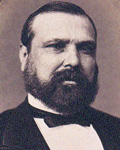 |
Blas Nicolás María Rivero
b. before 3 Feb 1814, Morón de la Frontera, Seville [1]
d. 5 Dec 1878, Madrid |
| Title: |
Presidente de la Asamblea Nacional (President of the National Assembly) |
| Term: |
11 Feb 1873 - 12 Feb 1873 |
| Chronology: |
11 Feb 1873, assumed the chairmanship as the elder of the two presidents of parliament chambers according to a law of 19 Jul 1837, session of the National Assembly, salón de sesiones del Congreso de los Diputados, Palacio de las Cortes, Madrid [2][3] |
|
12 Feb 1873, ceased to hold the office with the election of successor [4] |
| Biography: |
A foundling, of unknown parents, he was raised in a craftsman's family; studied medicine and law at the University of Seville; practiced law as attorney and was elected to the Cortes as a deputy for Seville (1846-1850, 1854-1856) and Valencia (1858-1863); one of the founding members of the Partido Democrático (Democratic Party) in 1849; governor of Valladolid (1854); earned recognition as brilliant orator and defender of the freedom of the press; participated in the street fighting during the revolt of 1866; served as member and vice-president of the Junta Provisional Revolucionaria de Madrid (30 Sep 1868 - 5 Oct 1868); member and vice-president of the Junta Superior Revolucionaria de Madrid (5 Oct 1868 - 19 Oct 1868); president of the municipal council of Madrid (1868-1870); deputy of the Cortes Constituyentes (Constituent Cortes, 1869-1871) for Madrid; President of the Constituent Cortes (12 Feb 1869 - 17 Jan 1870); served as minister of the interior (9 Jan 1870 - 25 Dec 1870); voted for election of King Amadeo I (16 Nov 1870); elected to the Cortes as a deputy for Écija, Seville (1871-1872) and Madrid (1872-1873); joined the Partido Radical (Radical Party) in 1872; President of the Cortes (16 Sep 1872 - 12 Feb 1873); briefly served as President of the National Assembly (11 Feb 1873 - 12 Feb 1873) convened to accept the abdication of Amadeo I; participated in abortive radicals revolt of 23 Apr 1873; fled to France (1873); returned to Spain (1874). Biography source: [5] |
| |
| [1] |
Although sometimes the date of birth of Rivero is indicated as being 6 Dec 1814 or otherwise, the only thing known is that he was left at casa de expósitos (foundling hospital) at Morón de la Frontera, Seville, on the night of 3 Feb 1814. |
| [2] |
Composed of the members of the Congreso de los Diputados and Senado, the Asamblea Nacional (constitutional term - Cortes) convened at 15:30 11 Feb 1873 to accept the abdication of King Amadeo I in accordance with Art. 44 of the Constitution of 1869; Rivero occupied the chair in accordance with a law of 19 Jul 1837, assigning the presidency at joint sessions to the elder of the two presidents (president of the Senado, Laureano Figuerola y Ballester, was two years younger); the abdication was accepted by acclamation and the assembly engaged into discussion of a motion to assume supreme authority and to proclaim Republic, which was agreed upon by 21:15 11 Feb 1873, at which point Rivero became senior state official (his signature appears on the decrees of 11 Feb 1873 and 12 Feb 1873); after a break, the session reopened at 00:00 12 Feb 1873 still chaired by Rivero; following the proclamation of the results on election of the Executive Power, Rivero ceded the chair to First Vice-President of the Congreso, Manuel Gomez, who suspended the session at 00:30 12 Feb 1873; the assembly reconvened at 15:00 12 Feb 1873 with Gomez in chair and elected Cristino Martos as a new president. |
| [3] |
Diario de las sesiones de Cortes: Congreso de los Diputados: legislatura de 1872 á 1873, esta legislatura dio principio el domingo 15 de setiembre de 1872 y terminó el martes 11 de febrero de 1873 (Madrid: Imprenta de J.A. García, 1873). Vol. 4. Número 108. P. 3203; Gaceta de Madrid, miércoles 12 de Febrero de 1873. Núm. 43. P. 502. |
| [4] |
Diario de las sesiones de Cortes. Op. cit. P. 3228. |
| [5] |
Enciclopedia de Historia de España. Vol. IV. Diccionario biográfico. (Madrid: Alianza Editorial, 1991). P. 736. |

